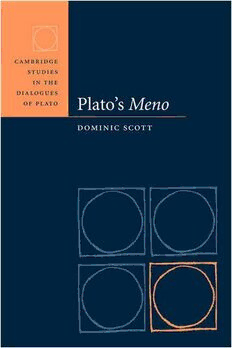Table Of ContentPLATO’S MENO
Givenitsbrevity,Plato’sMenocoversanastonishinglywidearrayof
topics: politics, education, virtue, definition, philosophical method,
mathematics,thenatureandacquisitionofknowledge,andimmor-
tality.Itstreatmentofthese,thoughprofound,istantalizinglyshort,
leaving the reader with many unresolved questions. This book con-
frontsthedialogue’smanyenigmasandattemptstosolvetheminaway
thatisbothlucidandsympathetictoPlato’sphilosophy.Readingthe
dialogueasawhole,itexplainshowdifferentargumentsarerelatedto
oneanother,andhowtheinterplaybetweencharactersisconnected
to the philosophical content of the work. In a new departure, this
book’sexplorationfocusesprimarilyonthecontentandcoherenceof
thedialogueinitsownright,andnotmerelyinthecontextofother
dialogues,makingitrequiredreadingforallstudentsofPlato,bethey
fromtheworldofclassicsorphilosophy.
dominic scott isSeniorLecturerinPhilosophyattheUniversity
ofCambridgeandaFellowofClareCollege.Hispreviouspublications
includeRecollectionandExperience:Plato’sTheoryofLearningandits
Successors(Cambridge,1995).
cambridge studies in the dialogues of plato
Serieseditor:MaryMargaretMcCabe
Plato’s dialogues are rich mixtures of subtle argument, sublime theorising and
superbliterature.Itistemptingtoreadthempiecemeal–byanalysingtheargu-
ments,byespousingorrejectingthetheoriesorbypraisingPlato’sliteraryexpertise.
ItisequallytemptingtosearchforPlatonicviewsacrossdialogues,selectingpas-
sagesfromthroughoutthePlatoniccorpus.ButPlatooffersusthedialoguestoread
wholeandonebyone.Thisseriesprovidesoriginalstudiesinindividualdialogues
ofPlato.Eachstudywillaimtothrowlightonsuchquestionsaswhyitschosen
dialogueiscomposedinthecomplexwaythatitis,andwhatmakesthisunified
wholemorethanthesumofitsparts.Insodoing,eachvolumewillbothgivea
full account of its dialogue and offer a view of Plato’s philosophising from that
perspective.
Titlespublishedintheseries:
Plato’sCratylus
DavidSedley
Plato’sLysis
ChristopherRoweandTerencePenner
Plato’sMeno
DominicScott
Forthcomingtitlesintheseries:
Plato’sEuthydemus
MaryMargaretMcCabe
Plato’sTimaeus
DorotheaFrede
Plato’sSymposium
RobertWardy
PLATO’S MENO
DOMINIC SCOTT
UniversityofCambridge
cambridge university press
Cambridge,NewYork,Melbourne,Madrid,CapeTown,Singapore,SãoPaulo
Cambridge University Press
TheEdinburghBuilding,Cambridgecb22ru,UK
PublishedintheUnitedStatesofAmericabyCambridgeUniversityPress,NewYork
www.cambridge.org
Informationon this title: www.cambridge.org/9780521640336
©DominicScott2005
Thispublicationisincopyright.Subjecttostatutoryexceptionandtotheprovisionof
relevantcollectivelicensingagreements,noreproductionofanypartmaytakeplace
withoutthewrittenpermissionofCambridgeUniversityPress.
Firstpublishedinprintformat 2006
isbn-13 978-0-511-14655-8 eBook(EBL)
isbn-10 0-511-14655-8
eBook(EBL)
isbn-13 978-0-521-64033-6 hardback
isbn-10 0-521-64033-4 hardback
CambridgeUniversityPresshasnoresponsibilityforthepersistenceoraccuracyofurls
forexternalorthird-partyinternetwebsitesreferredtointhispublication,anddoesnot
guaranteethatanycontentonsuchwebsitesis,orwillremain,accurateorappropriate.
ForAylin
Contents
Acknowledgements pageix
Introduction 1
part i
1 Theopening:70a–71d 11
2 The first definition: 71e–73c 23
3 Alessonindefinition:73c–77d 31
4 Thethirddefinition:77b–79e 46
5 Menoasaninterlocutor 60
part ii
6 Thestingray:79e–80d 69
7 ‘Meno’sparadox’:80d–81a 75
8 Theemergenceofrecollection:81a–e 92
9 Theargumentforrecollection:82b–85d 98
10 Theconclusion:86b6–c2 121
part iii
11 Themethodofhypothesis:86c–87c 129
12 Virtueisteachable:87c–89c 145
vii
viii Contents
13 Virtueisnotteachable:89e–96d 161
14 Virtueastruebelief:96d–100b 176
15 IronyintheMeno:theevidenceoftheGorgias 194
16 Meno’sprogress 209
Conclusion 214
Appendices 219
References 227
Indexofancientpassages 232
Generalindex 235
Acknowledgements
Most of this book was written while I was a British Academy Research
Readerin2001–3.Needlesstosay,IamenormouslygratefultotheAcademy
for this opportunity. I would also like to thank the Center for Hellenic
StudiesanditsDirectors,DebbieBoedekkerandKurtRaaflaub,foravery
productiveandenjoyablefellowshiptherein1998–9.Asever,Ioweagreat
debt of gratitude to the Cambridge Faculty of Philosophy and to Clare
Collegefortheircontinuedsupport.
Ihavebenefitedfromtryingoutthecentralideasofthisbookatvarious
seminarsandconferences.Mydebtstoindividualswhocommentedatsuch
occasions are too numerous to recall, but I would especially like to thank
Hugh Benson, Tad Brennan, Lesley Brown, Victor Caston, Terry Irwin,
ThomasJohansen,GeoffreyLloyd,MarkMcPherran,DavidSedley,Frisbee
Sheffield, Roslyn Weiss and Raphael Woolf. I am particularly grateful to
JimmyAltham,MylesBurnyeat,GailFineandRosannaKeefeforreading
earlierdraftsofthemanuscriptallthewaythrough.
IhavealsobeenveryfortunatethatGailFinegavemedetailedfeedback
onthemanuscript.Hercomments,invariablyincisive,havesavedmefrom
anumberoferrors.
From beginning to end, M. M. McCabe has acted as gadfly, midwife
and occasionally stingray (though only in the most beneficial sense). The
seriesofwhichthisbookformsapartisverymuchherinspiration.Ionly
hopeIhavedonehercredit.
Aswithallmyresearch,IalsoowealastingdebttoMylesBurnyeat,who
hasbeenacontinuingsourceofinspiration.
For some years, the Meno has been a set text on the undergraduate
philosophysyllabusatCambridge,andIoweaspecialdebttomystudents.
Theirobviousenthusiasmforthedialoguehasbeenaconstantdelightand
theirfeedbackyetanothersourceofinspiration.MyonlyregretisthatImay
havetoremoveitfromthesyllabustopreventfuturegenerationshounding
mewithlistsofmyerrors,nowthattheyhavebeencommittedtoprint.
ix

